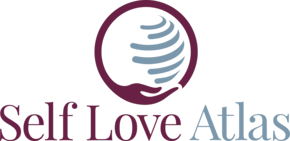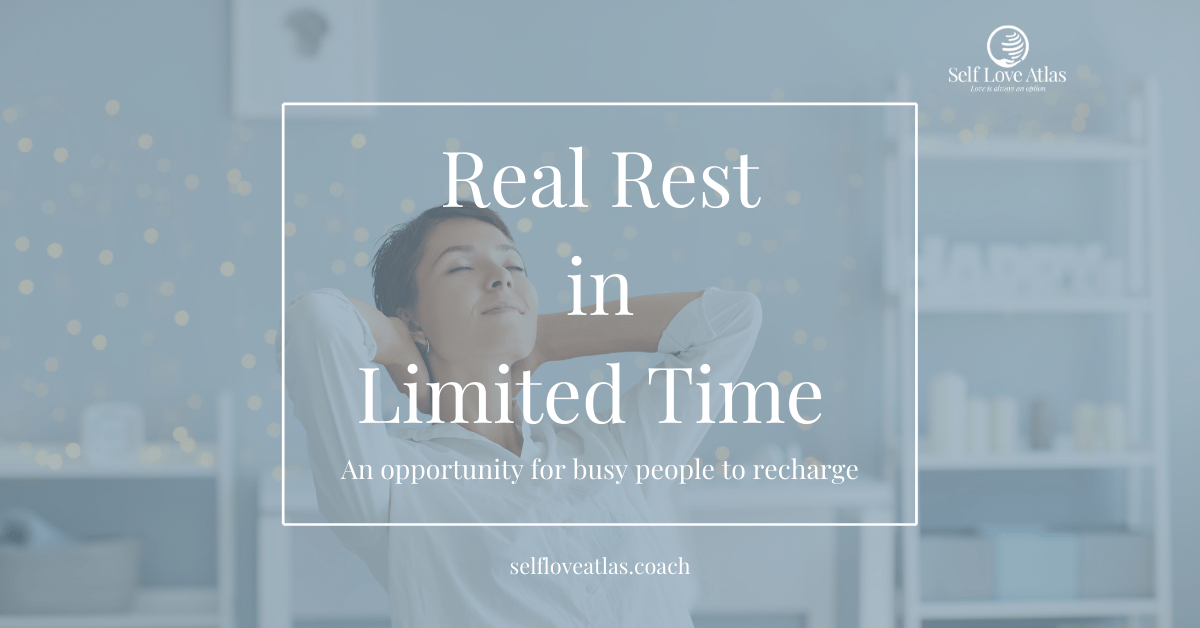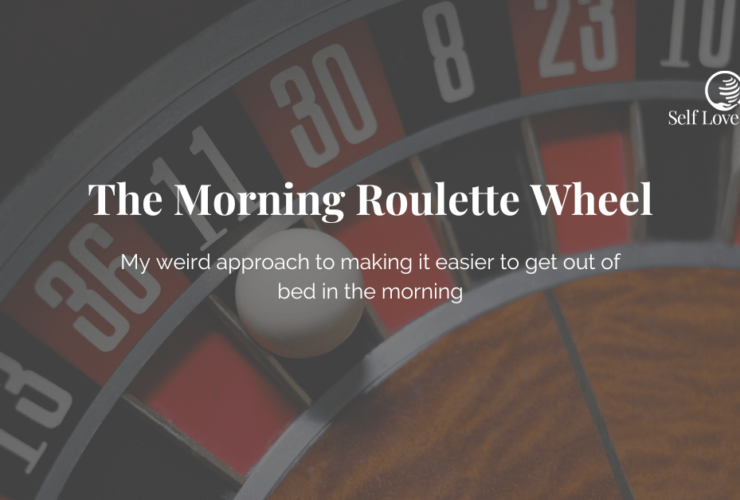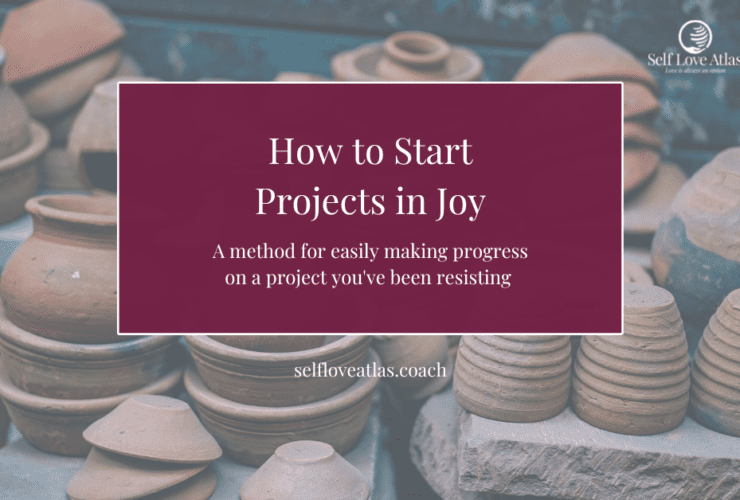Real Rest in Limited Time
Why does it seem like a day off is never enough to make us feel rested? In this post, I’ll answer that question and explain 3 lies busy people tell themselves about rest that prevent them from actually getting it. I’ll also provide 11 suggestions for rest and recharging that can fit into small spans of time so even the busiest people can find ways to rejuvenate more frequently.
When busy people are at the height of their packed schedules, you’ll hear them say things like “I just need a day to relax, but I don’t see that day coming anytime soon.”

Their tone is noticeably depleted, and you can see a bit of sulking in their body language. This is an awful feeling. I’ve felt it many times. But thankfully, you don’t need to wait until you can carve out a whole day to gain back some energy!
There are plenty of ways to lighten the load without needing to reserve large amounts of time to do it.
But first, let’s talk briefly about some of the lies many people tell themselves that get in the way of filling their need for rest.
3 of The Biggest Lies We Tell Ourselves About Rest
People tell themselves many things to convince themselves that rest or recharging is not available to them. But here, I’ve listed three of the most common ones.
Lie 1: “Rest requires large chunks of time that I don’t have.”
Busy people seem to believe that having a day to themselves would fix their problem of exhaustion, but when that day (or week) comes, it never seems to be enough. Sure, maybe they’re slightly less miserable, but ultimately, they’ve only gotten enough rest to be able to force themselves to continue, not enough to actually feel rejuvenated or ready for the next thing.
In reality, no amount of time will make you feel fully rested unless your mind actually slows down. So if you have a full day off but never stop thinking about all the things that are coming up once that day is over, then you end up not getting any rest at all (with the exception of when you’re sleeping).
Luckily, slowing down our minds and “resting” mentally really doesn’t have to take much time at all. All you need is to calm your constant thinking and, on some level, clear your mind.
However, if you’re like many people who believe they “can’t stop thinking,” then it will take some practice to get good at it. You can do this. But like any other skill, being able to clear your mind takes practice.
You’ll find plenty of suggestions for simple ways to practice this mental rest near the end of this post. Just know that the more you do these things, the more you’ll be able to get moments of rest when you need them.
Lie 2: “If I skip resting, then I’ll have more time to be productive!”
If you’re not allowing yourself to rest because you think it’ll make you more productive, then honey, you’ve got a big storm coming.
Sure, if you use this mentality for short term situations like finishing a big essay or finishing something that has a deadline, this mentality may work well for you… temporarily.
But as soon as this becomes something you’re saying to yourself on a regular basis, you’re setting yourself up for some problems.
What will ACTUALLY happen if you consistently delay rest in the name of productivity is: you’ll be productive short term, but in the long term, you might incapacitate yourself with either physical fatigue and/or illness (as I did during the majority of my college career) or mentally with misery and depression induced by chronic sleep deprivation.

I seriously cannot overstate the importance of getting sleep, and that no amount of productivity is worth sacrificing your overall well-being.
I’ll talk more about the need for adequate sleep in another post. But if you haven’t been sleeping enough lately and happen to be experiencing increased depressive symptoms, I’d highly recommend looking into research on the links between sleep deprivation and depression, it’s honestly quite shocking.
Lie 3: “The only reason I don’t feel rested is I’m not getting enough sleep.”
Okay, so this one probably isn’t a total lie. But it’s not the full truth either!
While it may be absolutely true that you’re not getting enough sleep (this is a common and valid problem), this doesn’t necessarily mean that “not enough sleep” is the sole reason that you do not feel rested.
When most people think of rest, they think of sleeping. But rest is much more than just that.
This false belief that the only way to rest is to get sleep prevents people from taking advantage of the alternative ways we can rest and rejuvenate ourselves while we’re awake! (Once again, some alternatives are listed at the bottom of this post, but I recommend reading this full post, because it helps to understand some of the science behind why we need to integrate rest into our waking hours).
On a daily basis, so many people miss out on opportunities to recharge just because they’ve internalized lies like these. So they spend most days pushing themselves farther and farther, without acknowledging the fact that human bodies and brains were not built to be maximally productive all the time.
“Wait, you’re saying that I’m not supposed to be able to work during all of my waking hours without breaks?”
Yes, yes I am.
Introducing the Basic Rest Activity Cycle
According to psychologist and sleep researcher Nathaniel Kleitman. Human brains seem to go through cycles during which we naturally have faster and slower brain waves. These cycles last approximately 90 minutes. Kleitman calls it the Basic Rest Activity Cycle, or BRAC.
Brainwaves are faster during the first half of the BRAC even while we’re awake. These faster brain waves correspond to feeling alert and focused. However, during the last 20 minutes of the cycle, brainwaves slow and the body generally feels more dreamy or tired in that timespan.
In other words, throughout our days, our brains and bodies naturally have more active times, and more dormant or passive times. This is why many people feel depleted at different times during their workdays (and often reach for a second or third cup of coffee in the middle of the day).

So if you were worried that something was wrong with you because you get tired at multiple points throughout your day, there’s not. You’re just a human being.
The cool thing about this is, if we allow ourselves to rotate between active and passive (i.e. restful) activities, we’ll be following more closely how our bodies naturally function (even if we only do those restful activities for short periods of time).
This means we’ll be able to feel less exhausted because we’re not forcing ourselves to be 100% active through multiple Basic Rest Activity Cycles.
So What Actually Qualifies as Rest?
In order for something to qualify as rest, it cannot be active. There are plenty of things that can be classified as “relaxing” or “self-care” that do not necessarily qualify as “rest.”
Take reading a book or watching TV for example. Although both of these tasks may function as some nice “me-time,” you’re still using your eyes and your brain for the very active task of interpreting and absorbing ideas or stories. Believe it or not, that takes energy and effort.
The things that qualify as rest often fall under what busy people (like me) would tend to call “doing nothing.” But the truth is, the ways of “do nothing” are actually quite diverse and enjoyable.
“Rest is not active, to rest is to surrender from the active, the goals, and the will to achieve something”
Karen Brody, women’s well being and leadership expert and author of “Daring to Rest”
Take for example, gazing at a sunset or the stars. When you stare into the sky, there doesn’t need to be a story, there can just be awe, stillness, and “space” in terms of having some distance between the thoughts and the clutter in our minds.
I like to think that resting is about experiencing the simple “space,” “stillness,” or perhaps the “aliveness” within ourselves.
When we sleep, our thoughts stop chattering, we allow space in our minds, and there’s a new stillness that arises internally.
But as I mentioned earlier, sleeping more and carving out vacation days are not the only way to experience rest, so here is a list of 11 other ways of resting that you can fit into smaller gems of time throughout your days.
The things that fall into this category are literally anything that helps you clear your mind and get away from the constant chatter of your thoughts. Anything that allows your mind to have that second piece of the Basic Rest Activity Cycle so you’re not forcing your brain to do things that it wasn’t designed to do.
The more I learn about this stuff, the more frequently I fit moments of rest into my daily life. And surprisingly, I find myself getting more done AND enjoying doing it.
11 Ways To Get Rest in Limited Time
1. Staring at a tree (or some other form of nature) for a few minutes.
2. Staring at a fireplace/firepit.
I know there’s a lot of staring at the beginning of this list. But staring at anything and focusing on it is probably one of the quickest ways to shift out of verbal thoughts and into just experiencing the moment. This alone will give your brain much needed rest.
3. Staring at the sky.
Whether it’s the stars, a sunset, a sunrise, or the clouds. Taking a few moments to just look at the sky is relaxing and grounding. There’s something about it that just says “The world and the universe is so much bigger than what I was worrying about a minute ago.”
3. Focus on the space between your eyes.
Many spiritual, yoga, and/or meditation teachers call this “the third eye”, but in physiological terms, it is the pineal gland, which releases melatonin and can reduce stress when you focus on it. (Yes, seriously.)
4. Allow yourself to take regular breaks.
For those of you who are deeply worried about losing time or productivity. It’s best to limit these breaks to twenty minutes on really busy days because anything over twenty minutes will increase what is called a “refractory period” which basically means it will be much harder to go back to your main task if the break goes too long. But a 15-20 minute break will actually increase productivity during your focus time. 🙂
5. Listen to music.
This will activate both hemispheres of the brain, reduce stress responses, quiet some of the extra chatter in your mind, and just give you a bit of a boost. (This seems to be one of the main strategies full-time employees and students use to make their long days a bit more bearable.)
6. Take a walk.
This is not necessarily rest for your body, but it certainly can be rest for your brain!
7. Get outside, in any form, and just listen to the sounds around you.
Although, if all you can hear is traffic, you might want to choose another option.
8. Zoning out/daydreaming.
No matter where you are, allowing yourself to drift a little bit, perhaps by visualizing something pleasant and mentally taking yourself to a good place can really have a very calming effect.
9. Ground yourself in your body.
Some ways of doing this include noticing your own breathing, feeling your heartbeat, or just focusing on any sensations you can feel. By focusing on the “aliveness” in you body, you begin to dissolve the presence of your mental chatter.
10. Meditation.
I know this isn’t everyone’s cup of tea, but BOY does it work if you’re willing to give it an honest go. (I highly recommend yoga nidra meditation, it involves laying on the ground instead of sitting up, which I find is way more relaxing.)
11. At the very least, and if nothing else, take some deep breaths.
Most people’s breath is unnaturally unnaturally shallow when their minds are very busy and loud. So just getting some more oxygen up there will help get any practice of rest started.
In Conclusion
You don’t need lots of time to get at least SOME rest, you just need to be willing to allow yourself to rest in whatever small opportunities you have. You don’t need to be a productivity machine, you just need to be okay with being human, so you can get good at being.
I hope this post helps you give yourself permission to slow down and do nothing every once in a while, even if just for a moment. Because honestly, everybody needs it sometimes.
Did this post resonate with you? If so, I’d love to hear from you! Leave a comment or send me a message to share your thoughts. For more uplifting content, check out some other posts on my blog, follow me on instagram @morgan_barbret, or sign up for the Self Love Atlas Newsletter!
Cheers,
Morgan Rita Barbret





